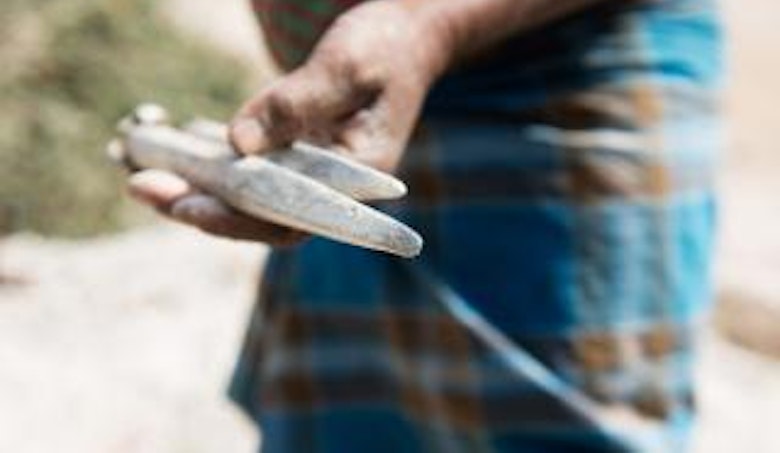Daimler AG Joins Forces with Terre des Hommes and the Responsible Mica Initiative
Daimler AG announced today that it is making a substantial donation to Terre des Hommes Netherlands and will also join the Responsible Mica Initiative (RMI). Daimler’s combined initiatives are designed to amplify the resources that can be used to support the shared objective of all three organisations - to eradicate child labour and improve working conditions in India’s mica mining regions.
The initiative
Daimler’s initiative is an important recognition of mica’s versatility and the critical role the mineral plays in the global automotive manufacturing sector. Indeed, mica’s reflective properties have made it an important ingredient in automotive paints and coatings thanks to the sparkling effect it creates when reflected by light. As a functional filler, mica is used in the plastic components that make up automotive bumpers, mirror housings, and other parts that manufacturers use to reduce vehicle weight to save fuel. Mica is also a natural insulator and is found in a variety of electrical components in vehicles.
“The cooperation with Terre des Hommes and the Responsible Mica Initiative is another important step for Daimler in combating child labour in mining regions,” says Renata Jungo Brüngger, Member of the Board of Management of Daimler AG and Mercedes-Benz AG, responsible for Integrity and Legal Affairs. “With the joint project in India, we are complementing our measures to protect human rights in our supply chains, such as our Human Rights Respect System and the related audits. We are thus creating future opportunities for the local people.”
"Daimler is fully aware of its responsibility: mica and other raw materials must be extracted and processed under ethically responsible conditions," emphasizes Markus Schäfer, Member of the Board of Management of Daimler AG and Mercedes-Benz AG; responsible for Daimler Group Research and Mercedes-Benz Cars COO. “Our company's commitment to projects together with social organizations is important to ensure the high social and environmental standards of Daimler AG along the entire value chain. We have started our activities on the mica supply chain already in 2018 and we will not tire of pursuing the solution.”
A leading civil society organisation devoted to the protection of child rights, Terre des Hommes Netherlands has been identifying and reporting on working conditions in India’s mica mining states of Jharkhand and Bihar since 2015, and has created programs to improve the lives of children and their communities in more than 60 villages. Terre des Hommes Netherlands’ landmark 2016 research into child labour in the two states, followed by a 2018 study on child labour in the global mica supply chain, and 2019 report on the Madagascar mica sector, has drawn global attention to working conditions in the mines.
Carel Kok, CEO of Terre des Hommes Netherlands: “As Terre des Hommes and as one of the driving forces behind RMI, we are very pleased with the step Daimler AG is taking. Daimler is the first car company that is openly committing to eliminating child labor from its supply chain and that joins the RMI. I hope that more car manufacturers will choose to take active steps to eliminate child labor from their supply chain, amongst others by joining hands in taking more than 30.000 young children working in mica mining globally out of the mines and investing in their future.”
In 2017, companies involved in the global mica supply chain along with Civil Society Organisations created the Responsible Mica Initiative (RMI) with a goal of eradicating child labour and improving working conditions in the mica mining regions of Jharkhand and Bihar in India. A multi-stakeholder, impact-oriented Coalition for Action, RMI has introduced programs to improve overall working conditions in the mica sector and tackle the underlying problems of poverty, poor health, inadequate educational resources, and lack of access to governmental resources. These programs have been implemented by local NGOs RMI is partnering with in more than 80 villages in the mica mining area.
About Daimler & Terre des Hommes partnership
Terre des Hommes Netherlands and Daimler have entered into a three-year partnership, wherein Daimler will be directly investing in sustainable interventions to combat child labour in mica mining areas of Jharkhand state in India. In 2018, Mercedes-Benz had already examined the entire supply chain for mica - from the mine to the painting of vehicles in the plant, including auditing the mines and converters. During its on-the-spot visits to different stages in the mica supply chain, Mercedes-Benz Cars discovered and assessed isolated abuses and took corresponding measures. In supporting Terre des Hommes and the RMI, the company is extending its existing activities by a further important measure.
The approach of Terre des Hommes and partner organisations is participative and comprehensive. The project activities include awareness-raising, Government engagement, livelihood interventions, and quality of education. Furthermore, project stakeholders are closely involved with the design, evaluation and implementation, including children and their families. The project will be implemented by Terre des Hommes and three local partners: Bhartiya Kishan Sangh, Jago Foundation and Rashtriya Jharkhand Seva Sansthan and will run for three years, from 2020 to 2022. In recognition of the worsening of the situation in Jharkhand due to the corona crisis, Daimler and Terre des Hommes Netherlands have also invested in COVID-19 mitigation measures in the mica mining communities
About the Responsible Mica Initiative (RMI)
RMI is a global Coalition for Action comprised of multiple organisations committed to establishing a fair, responsible and sustainable mica supply chain in India that will eliminate unacceptable working conditions and eradicate child labour by 2022. RMI uses a multi-stakeholder and holistic approach that engages companies, civil society organisations, industry associations and governments to develop and implement three integrated program pillars that will establish responsible workplace standards, empower local communities and support establishment of a legal framework for the mica sector.

